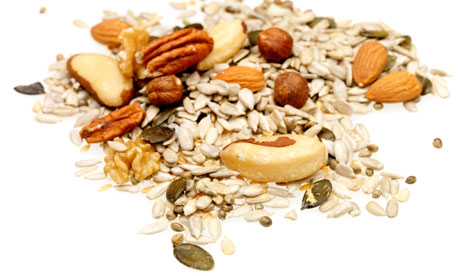
Maintaining a low-fat diet is one of the mantras of healthy eating. If you want to lose weight or stop cholesterol clogging up your arteries, you should cut out the fat. Or should you? New research from Cambridge University published in the journal PLoS Medicine shows if you cut out "good" as well as bad fats, you may not reduce your risk of heart disease. Furthermore, if you eat lots of saturated fats, and little of the more protective omega 6 polyunsaturated kind, you increase your risk.
Over 13 years, the study analysed data on 10,000 people aged 40-79 who were part of a bigger European study of risk factors for cancer. It looked at the levels of specific fatty acids in the blood of people with heart disease compared with people who didn't have the condition. The researchers controlled other factors that cause heart disease, such as smoking, exercise and physical activity. They say their research shows you should replace bad fats with good ones. Are you eating enough good fats?
The solution
Fats are essential to life. Some of the fatty acids we need as building blocks for hormones, to transport vitamins A, D, E and K around our bodies and control inflammation, can only come from food. Fats give nine calories of energy a gram, which is twice that of carbohydrate or protein. What matters is not avoiding fats altogether but eating the right ones and not replacing bad fats with trashy carbohydrates such as white bread and products laced with sugar.
Saturated fats (the delicious ones in cheese, ice–cream and pastries) make the biggest contribution to high levels of low-density lipoproteins – the bad cholesterol that clogs up arteries – although the body makes its own cholesterol. Unsaturated fats still have shedloads of calories but can help to lower cholesterol. By how much is debated. The most common source of omega-6 fatty acids in the west is linoleic acid, found in sunflower oil, corn and soybean oil, nuts and seeds.
However, the world of nutrition is not simple and there is an ongoing debate about the risks of increasing intakes of omega-6 fatty acids by too much. An article in the journal Clinical Nutrition warned that high levels of linoleic acid have raised the risk of cancers in animals, through increasing the oxidation of low-density lipoproteins.
The Harvard School of Public Health's analysis of fats also says you need healthy fats not low fats in your diet. You don't need any more than 30g a day for men or 20g a day for women and most should come from unsaturated fat. About 10-15% of calories a day should come from unsaturated fats. Any more than that and you need to look at your dietary pattern as a whole. A Mediterranean-style diet has lots of fats (from olive oil and nuts) but also vegetables, fruits and whole grains. It doesn't have refined carbohydrates, which increase the risk of obesity, diabetes and heart disease, and it reduces heart disease. Plus, it's pretty tasty too.

